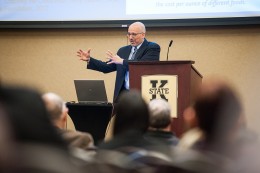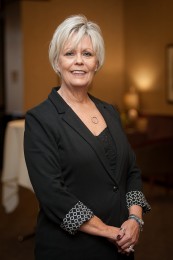By Anna Shippy

anniversary kickoff event.
For half a century, Kansas State University Global Campus has adapted to meet the educational needs of students. New technologies
and methods of teaching made way for more opportunities to extend K-State to the world. But what’s next in the future of higher education? What lies beyond online learning?
To kick off the K-State Global Campus 50th anniversary celebration, Louis Soares, vice president for the American Council on Education’s Center for Policy and Research Strategy in Washington, D.C., presented a lecture on the future of higher education. In the lecture, Soares advised that universities must adapt to higher education trends to meet student needs.
High-tech vs. high-touch
According to Soares, universities need to balance high-tech educational capabilities with frequent and meaningful contact with students. Each touch point with a student is an opportunity to enhance learning through direct access to an instructor, resource or student service. As technological advancements shape how K-State delivers education, consistent and helpful interactions contribute to online learner success and a positive college experience.
Hybrid delivery
The idea that education is an “either/or” choice — either on campus or online — is a thing of the past. Soares predicts that hybrid delivery for degree programs will become the norm, with students utilizing a “both/and” approach by taking online classes and traveling to campus for cohort and networking experiences.
Job-focused results
Soares explained that universities need to leverage the resources they have and create educational programs that help students in their fields. Information learned in classes should be relevant and immediately applicable to the workplace. Higher education must focus on how coursework will help students get the job they want and gain traction from what they’re learning.
Extra content and resources
Learning doesn’t end at graduation. Soares advises universities to offer free content and resources to students beyond their time in the classroom. K-State continues to provide trusted professional content in areas not typically covered in academic lectures. This content, such as how to write a strong resume, or pitfalls to avoid during interviews, can give students a competitive edge at any point in their careers.
K-State Global Campus embraces the changes and trends in higher education to prepare students and professionals for their own bright futures.
VIEW THE LECTURE
See the archived lecture and upcoming anniversary events at global.k-state.edu/50/future/events.
The student perspective
By Ashley Nietfeld

lecture panel.
Providing the distance student’s perspective on the future of higher education during the anniversary lecture was guest panelist Beth King. A student in the online interdisciplinary social science bachelor’s degree program, King was inspired by her four children, all K-State graduates, to finish the degree she started in her teens.
“Their graduations instilled me with deep pride and the lingering question of whether I, too, could be a college graduate,” King said. “When I contemplated this question, there was no university under consideration other than K-State.”
King admits that when she first enrolled in college after high school, she did not have the discipline required to be successful. She dropped out, expecting to finish her degree a few years later. However, life circumstances got in the way, and King moved to Washington, D.C., and began working on Capitol Hill. Eventually, she landed in Wichita, Kansas, and opened her own public relations firm, King Merj Public Relations.
“I don’t expect my degree to change my professional status; I’m really doing this for myself,” she said. “While my career has been very fulfilling, I am most proud of being a mother. And second in line to that will be my pride in eventually being a graduate of Kansas State University.”